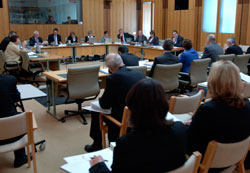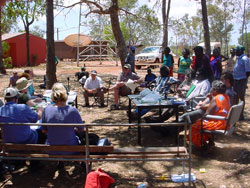General committee provisions
34 Powers

The Rural and Regional Affairs and Transport Legislation Committee taking evidence from witnesses in Parliament House (Photo cortesy of AUSPIC)

The Select Committee on Regional and Remote Indigenous Communities taking evidence from witnesses at Elcho Island, in northeast Arnhem Lant, NT
-
The Senate may give a committee power to send for persons and documents, and a committee with that power may summon witnesses and require the production of documents.
-
The chairman of a committee shall direct the secretary attending the committee to invite or summon witnesses and request or require the production of documents in accordance with the orders of the committee.
Amendment history
Adopted: 19 August 1903 as SOs 294 and 295 (corresponding to paragraphs (1) and (2)) but renumbered as SOs 290 and 291 for the first printed edition
1989 revision: Old SOs 302 and 303 combined, renumbered as SO 34 and repositioned from old chapter XXII on select committees; expression updated to reflect current terminology and the Privilege Resolutions of 28 February 1988 which required witnesses to be invited to appear before being summoned
Commentary
Standing order 34 does not confer on committees the power to send for persons and documents. It sets out the process by which committees should exercise that power if it is conferred by the Senate. In this regard, it is a parallel provision to SO 176.
Invitations or summonses are issued by the committee secretary at the direction of the committee. If a witness refuses to comply with an order of a committee, that refusal may be treated by the Senate as a contempt.[1] See SOs 176–83 on witnesses.